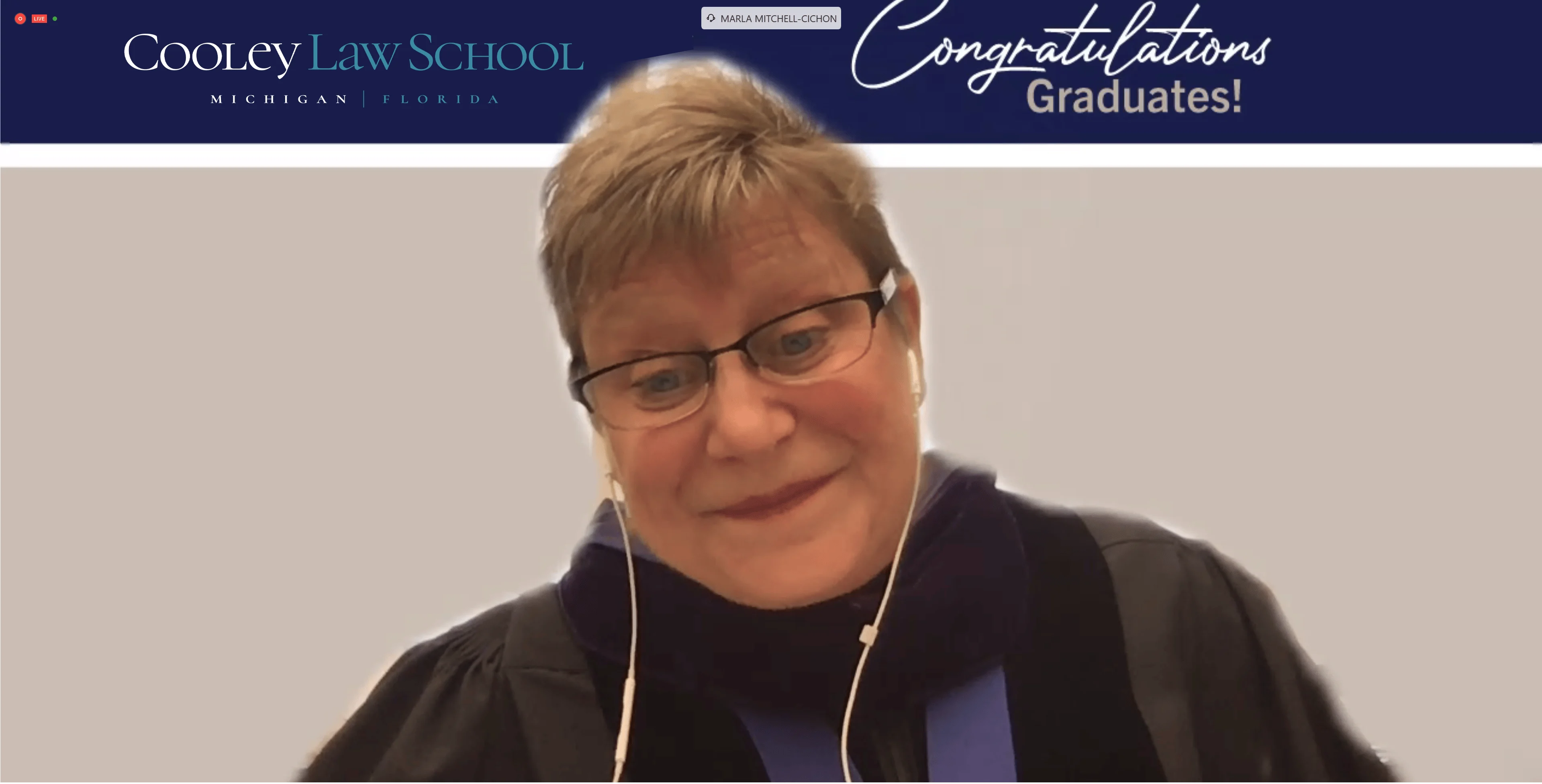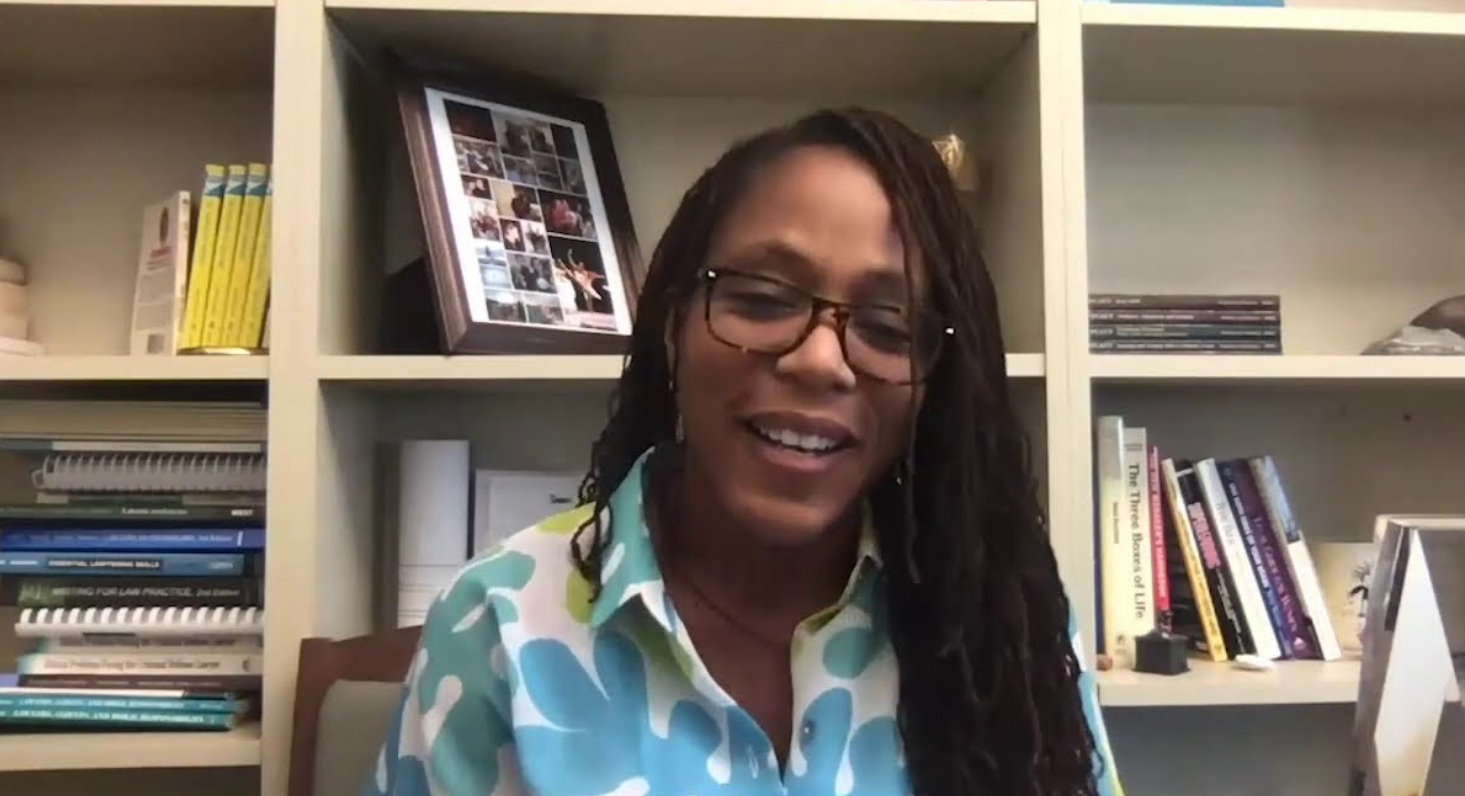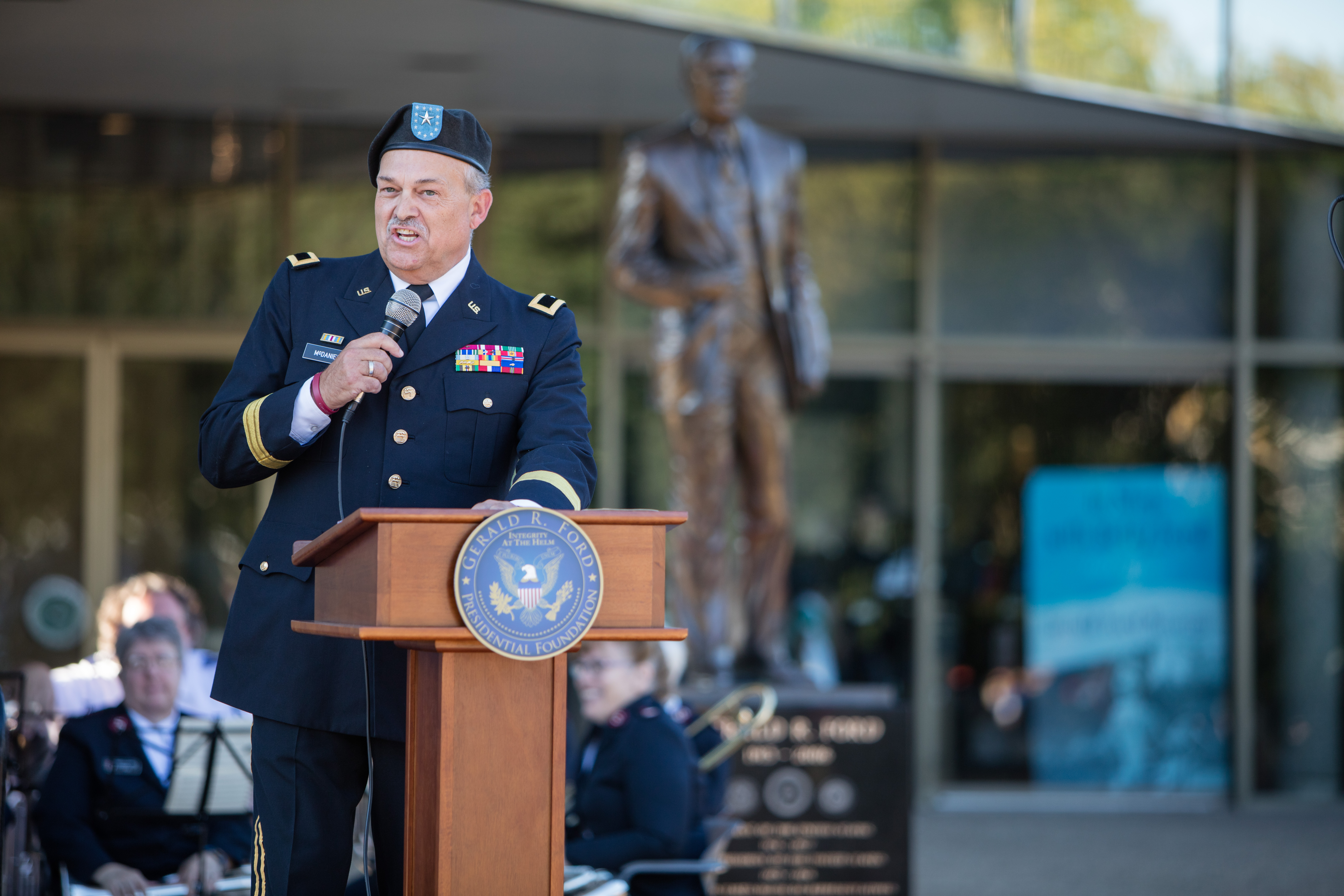
WMU-Cooley Associate Dean and Ret. Brig. Gen. Michael C.H. McDaniel was the keynote speaker during the 2018 Grand Rapids Community Day of Remembrance and Scout Salute, an event honoring those who died and the first responders who went into action during the terrorist attacks of Sept. 11, 2001. Below is his speech.
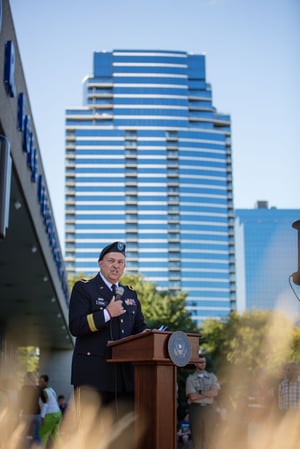 It was a beautiful late summer day.
It was a beautiful late summer day.
Seventeen years ago, Osama bin Laden’s terrorists, using hijacked passenger planes as weapons, killed 2,977 people in a single awful raid on the United States. The Al-Qaeda attack horrified and angered the nation — but also caused Americans to rally together as they had not done since Pearl Harbor.
Eighty-two percent of Americans spontaneously displayed the flag in the days just after the Sept. 11, 2001, attacks, according to a Gallup poll. Some 150 members of Congress from both parties gathered on the Capitol steps and sang “God Bless America1.”
Soon thereafter, a huge bipartisan majority voted to give President George W. Bush expansive authority to wage a retaliatory “war on terror” which continues to this day2.
At the time, many thought 9/11’s galvanizing impact on the American body politic would last, that it would help close the alarming partisan fissures opened during the 1998 impeachment of Bill Clinton and the disputed 2000 Presidential Bush vs Gore battle. National unity would be the redeeming consequence of an otherwise awful day.
Throughout our history, external threats have forced the American people to put aside their differences for the sake of the common defense3. Obviously, it has not worked out that way. Gone, long gone, are the singing, flag-waving and bipartisanship of the 9/11 aftermath. In their place, we have a polarized, hate-filled political climate. In hindsight, we never should have expected the war on terror to unify the United States, as the two world wars or, to a large extent, the Cold War did.
Those conflicts pitted the United States against nation-states whose defeat — or, in the case of the Soviet Union, containment — could be intelligibly defined and realistically anticipated. Bright lines could be drawn between friend and foe. Rules of war could be more readily identified and upheld4.
The war that began on 9/11 and continues today, in various forms, in Afghanistan, Iraq, Syria, Yemen — even parts of Africa — was and is a protracted, shadowy conflict against irregular forces. You might call it counterinsurgency on a global scale. By its nature, such a war forces difficult and divisive policy questions on any democratic government obliged to wage it5.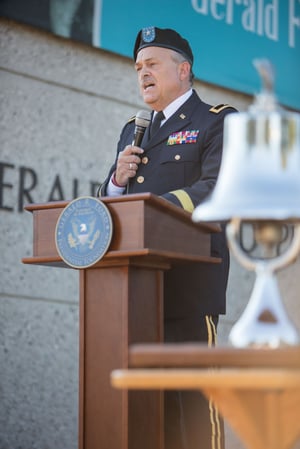 Should we fire missiles from drones even when terrorists reside among civilians? Dare we use “enhanced interrogation” to question suspects? Dare we not? Should we try captives in military courts or civilian ones? Is the Islamic State part of the same enemy against which Congress authorized the use of force in 2001, or does the Constitution require fresh legal authority to fight it6?
Should we fire missiles from drones even when terrorists reside among civilians? Dare we use “enhanced interrogation” to question suspects? Dare we not? Should we try captives in military courts or civilian ones? Is the Islamic State part of the same enemy against which Congress authorized the use of force in 2001, or does the Constitution require fresh legal authority to fight it6?
Given that the 9/11 terrorists infiltrated the United States and, in theory, the enemy could be anywhere, there are also the insidious pressures to keep out foreigners and to mount increasing surveillance domestically, which have spawned bitter debates.
Yet divisions over the conduct of prolonged irregular warfare were bound to intensify sooner or later, as they did during the Vietnam War. By its nature, such a conflict breeds difficult policy dilemmas, and democracy, by its nature, processes such controversies through partisan conflict7.
Here in the U.S., one of the outcomes of our system of democracy is that we always have an opponent to point out our faults. As a nation then we are gifted at self-examination, even self-criticism, and much of our discussion about 9/11 in the last 17 years has focused on what went wrong.
First, a failure to share intelligence, a failure of agencies to coordinate activities, — real failures of intelligence and imagination that allowed the attacks to happen;
Presumed failures of foreign policy that gained Al Qaeda sympathy among some Muslims; and failures in our response to radical Jihadism, whether in Afghanistan, Iraq, or Guantanamo Bay, that are generally, though not universally, understood to have set us back in the war to defeat Al Qaeda and its tyrannical and medieval ideology8.
Now: A failure to have foreseen the consequences of those actions.
How our military actions have lead to destabilization in certain countries, have changed the balance of power, have shoved Iran, a potential ally against Iraq, into the arms of the Russians. How that same Authorization for the use of Military Force is itself outdated, and distorted, as the enemy of 9/11 is not the enemy 17 years later.
That criticism should be welcomed. We want and need our elected leaders to engage in that debate.
For if we failed in our strategic thinking in the Middle East. There was no moral failure in the United States.
Self-criticism is necessary, even indispensable, for democracy to work. But this decade-long drama began with the unprovoked murder of 3,000 people, simply because they were American, or happened to be located in proximity to Americans.
Healthy and civil self-criticism is needed. That is the purpose of congressional debate as envisioned by our Founding Fathers.
That solidarity has been shaken by rising political polarization in recent years — a dangerous development because, today, the United States faces staggering global security challenges.
National unity is essential as the United States responds to myriad threats, including Russia’s attempts to weaken us at home and abroad, Iran’s military adventurism and support for terrorism, and North Korea continuing nuclear threat9.
China’s People’s Liberation Army is on a path to becoming a military power stronger than any the United States has encountered since the days of the Soviet Union. Beijing knows that any contest in Asia between China and an adversary, including the United States, would first be a naval- and air-combat engagement, and the Chinese have prepared accordingly, developing sophisticated capabilities at sea, in the air — and even in space. China’s military is also undergoing its most profound organizational reforms since the modern nation’s founding in 1949. Beijing is better capable of projecting military power than ever.
China makes a particularly challenging adversary because it deploys legitimate economic and diplomatic tactics, such as free-trade agreements and development assistance, and illegitimate ones, such as intellectual property theft, economic coercion and the seizure of contested islands in the South China Sea10.
Today, we remember.
The sign on the wall as you walk into the CIA’s Mission Center for Counterterrorism still reads, “Today is September 12, 2001.”
The sign represents the sense of urgency that the officers who work there still bring to the job of protecting the country, every day, from terrorism. The effort has been a remarkable success, considering that extremist terrorists have repeatedly attempted to attack the U.S. homeland. International terrorism is by no means abolished; vigilance is still required. But the nation is much safer today than it was before 9/11, in no small part because we put our political differences aside in the interest of national security.
We remember one of the most devastating tragedies our country has ever faced. We remember the thousands of American lives lost, and our hearts go out to their families and loved ones.
When the towers fell, the men and women of the NYPD, FDNY, EMS, Arlington County Sheriffs, Pennsylvania state troopers, federal and state law enforcement officials, and other first responders didn’t think twice before rushing toward Ground Zero, the Pentagon and a now sacred field in Shanksville to save the lives of everyone they could. But now, 17 years later, these first responders are still suffering life-altering and too often life-ending illnesses because of their heroism.
Almost 10,000 First responders to the WTC alone have been diagnosed with cancer.
More NYPD officers have lost their lives since 9/11 because of the toxins they inhaled at Ground Zero than died on the day of the attacks.
This death toll among our first responders continues to rise due to 9/11-related illnesses.
There is a moral obligation for all of us to remember that the costs of war, those have lost not only lives, but limbs and those who suffer internal injuries to body and mind, have a far far greater cost to the community and country.
And, is increasingly evident, the same is true of our First responders. There is a moral obligation for Congress to continue to stand by every single one of these heroes.
I say to the Scouts here today, my proudest accomplishment is to be an Eagle Scout. Whatever I have done since that day, is due almost entirely to the scout oath. A scout, by making an oath, “on his honor” is making a sacred promise, a vow to pursue a life of duty. Duty to God, Duty to Country, Duty to his community (to help other people at all times) and to himself, (to be physically strong, mentally awake, morally straight).
So, I want to say a few words about the practice of saluting.
Ronald Reagan is often credited as being the first U.S. President to regularly salute the troops. George W. Bush was known for frequent salutes, including a gaffe when he saluted while holding the presidential pooch. Barack Obama once saluted with a cup of coffee in his hand.
Before we get too worked up, remember that most earlier presidents did not bother to salute, rendering more civilian honors, including Harry Truman holding his hat over his heart. In the Navy, you can salute with either your left or right hand. In the Army, it was literally drilled in to me to always keep my right hand free and available, whether to salute or to have control over my weapon.
A salute is defined as a gesture of respect, homage, or polite recognition or acknowledgment, especially one made to or by a person when arriving or departing.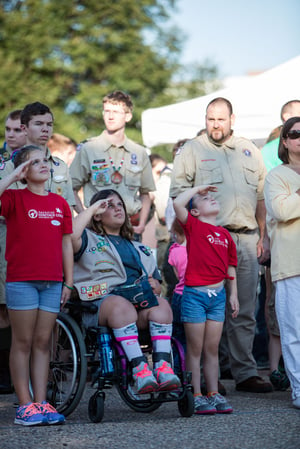 All of us, Scouts and First Responders are in uniform voluntarily, We have chosen to accept the uniform and insignia required by our troop, department or service branch, In doing so, to build unit cohesion and morale, and more, as a sign of respect and recognition of the service of others, we accept and promote the traditions and culture of that service agency or troop. Including the manner in which we salute our American flag.
All of us, Scouts and First Responders are in uniform voluntarily, We have chosen to accept the uniform and insignia required by our troop, department or service branch, In doing so, to build unit cohesion and morale, and more, as a sign of respect and recognition of the service of others, we accept and promote the traditions and culture of that service agency or troop. Including the manner in which we salute our American flag.
But that duty does not apply to civilians. As civilians they owe no such no duty. They should honor the flag, just as they should honor those that fought for our country, for those who kept them free, for those who kept them safe, for those who chose to wear the uniform for such service to all of us.
But, the verb is “should.” It is not a duty, nor should it be.
TR said it is not the critic who counts; not the man who points out how the strong man stumbles, or where the doer of deeds could have done them better. The credit belongs to the man who is actually in the arena, whose face is marred by dust and sweat and blood; who strives valiantly;
So, I say today, it is not the salute, it is the message that counts.
Are we respectful towards the flag, and more importantly, are we respectful to the nation for which it stands? There are as many ways to show that respect as there are people.
Always remember those who serve.
My grandfather (Boy Scout Leader starting in 1934 and recipient of the Silver Beaver Award back when they were pure silver), had a story:
In the days when an ice cream sundae cost much less, a 10-year-old boy entered a hotel coffee shop and sat at a table. A waitress put a glass of water in front of him.
"How much is an ice cream sundae?" he asked.
"Fifty cents," replied the waitress.
The little boy pulled his hand out of his pocket and studied the coins in it.
"Well, how much is a plain dish of ice cream?" he inquired.
By now more people were waiting for a table and the waitress was growing impatient. "Thirty-five cents," she brusquely replied.
The little boy again counted his coins. "I'll have the plain ice cream," he said.
The waitress brought the ice cream, put the bill on the table and walked away.
The boy finished the ice cream, paid the cashier and left. When the waitress came back, she began to cry as she wiped down the table.
There, placed neatly beside the empty dish were two nickels and five pennies.
You see, he couldn’t have the sundae, because he had to have enough left to leave her a tip.
This isn’t a story about tipping. It is a story of a young boy who had been raised by his parents to know what was the right thing to do, and to do the right thing.
In this case, like in almost every case, the right thing is service to others.
The young boy knew that even a simple pleasure like a bowl of ice cream required a team, and that every member of that team, including the waitress, needed to be recognized. In the Army, one of our values is “selfless service.” In Boy Scouts, Baden-Powell “Do a Good Turn Daily” and the oath says we promise to do our best to do our Duty.
Scouts, we ask only that you do your best to do your duty. To God, country and community and to yourself, in service to others.
In closing, I would refer to the beautiful poetry of our greatest President. In the Gettysburg Address, Abraham Lincoln, provided the format for all similar speeches:
But, in a larger sense, we can not dedicate — we can not consecrate — we can not hallow — this ground. The brave men, living and dead, who struggled here, have consecrated it, far above our poor power to add or detract. The world will little note, nor long remember what we say here, but it can never forget what they did here. It is for us the living, rather, to be dedicated here to the unfinished work which they who fought here have thus far so nobly advanced. It is rather for us to be here dedicated to the great task remaining before us — that from these honored dead we take increased devotion to that cause for which they gave the last full measure of devotion — that we here highly resolve that these dead shall not have died in vain — that this nation, under God, shall have a new birth of freedom — and that government of the people, by the people, for the people, shall not perish from the earth.
[1] Charles Lane, NYT. 11 September 2018
[2-8] Id.
[9] Michael Morell, NYT, Op, 10 Sept 2018
[10] Id

